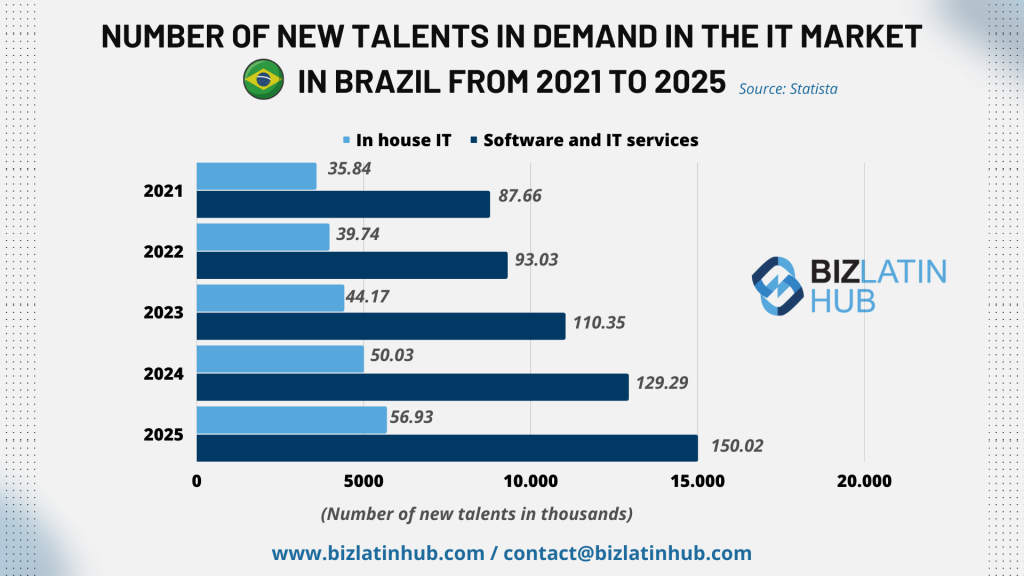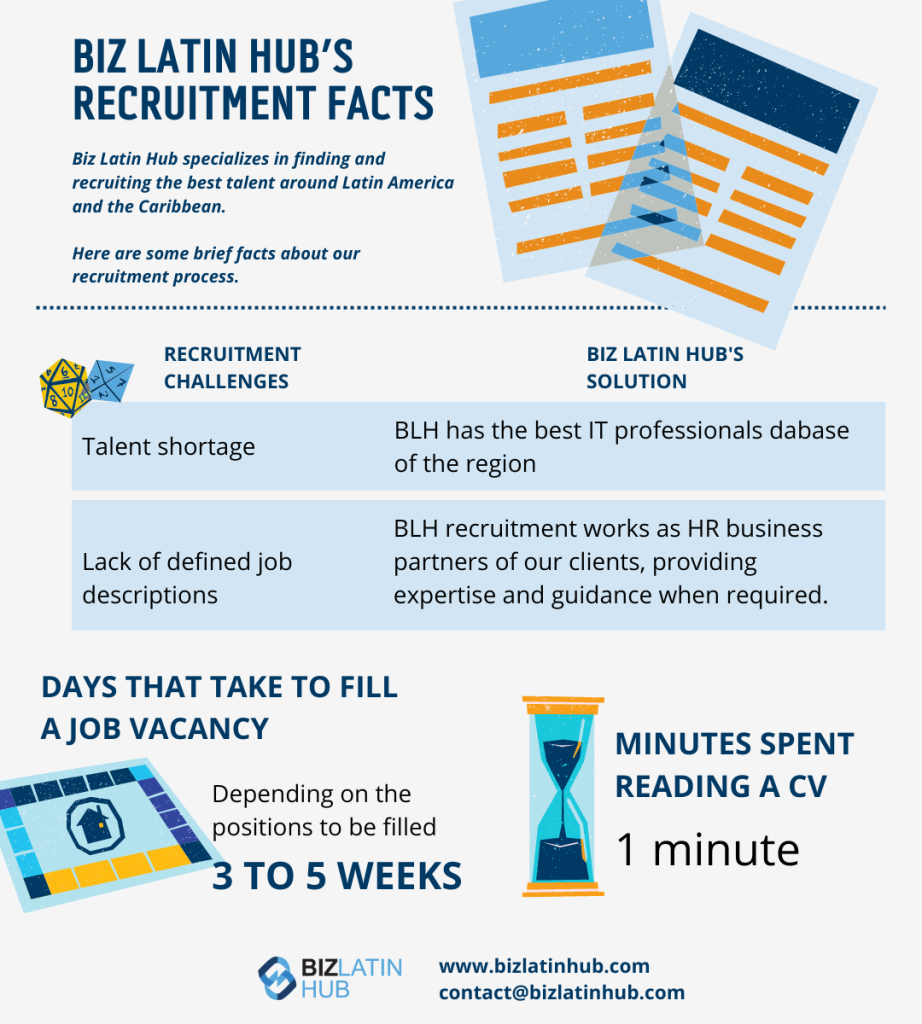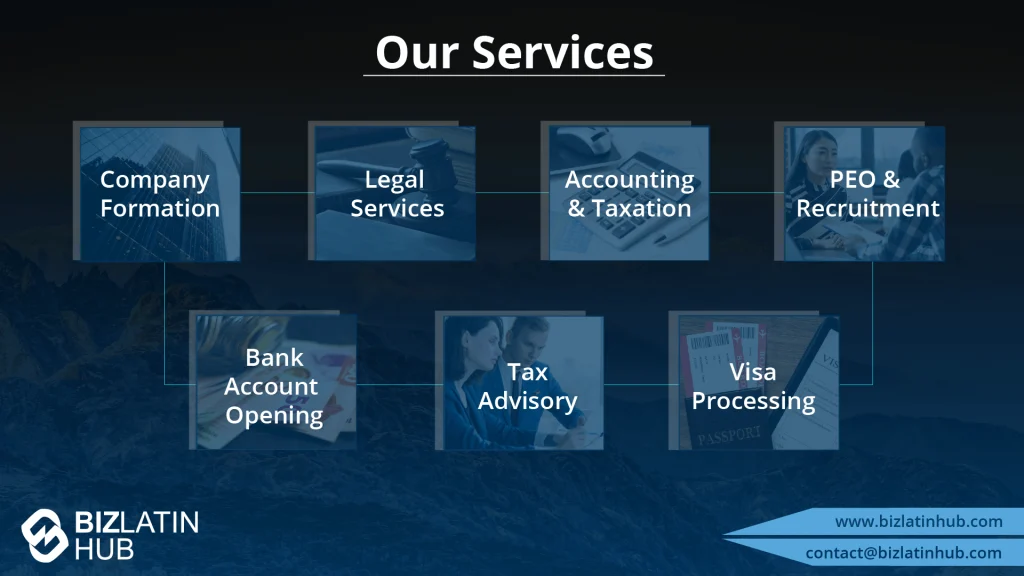With its large and diverse economy and vast domestic consumer market, Brazil has long been a desirable destination for foreign investment. But for entrepreneurs and companies entering the Brazilian market for the first time, putting together a local team of senior management and IT professionals can be daunting. That’s why many business newcomers utilize the services of a headhunter and/or IT recruitment in Brazil.
When it comes to IT recruitment in Brazil, the competition for the best tech talent has been heating up in recent years. Those starting a company in Brazil not only have to compete with local companies for the best tech talent, but also with US and Portuguese companies that offer handsome wages and a 100-percent work-from-home arrangement.
Brazil’s tech-talent labor pool is far larger than any other country in Latin America. There are by some estimates as many as 500,000 Brazilian software developers, and as many as 1.2 million IT professionals – and even with those numbers – sky-rocketing demand for qualified tech professionals is outpacing supply.

IT recruitment in Brazil: Top 5 reasons to hire tech talent
Whether your business is established in the country, or headquartered in North America, what follows are the advantages that come with IT recruitment in Brazil:
1. Cost savings
Brazilian IT/tech professionals will accept roughly one-half the salary of an American doing the same job in the US. For example, a software developer in Brazil makes $50,000 to $60,000 USD per year, while their US counterparts can expect to receive $90,000 to $100,000 USD. The cost-saving numbers speak for themselves.
2. Large focus on tech-related education
Brazil is home to some reputable universities that specialize in the fields of engineering, technology and computer science, ensuring new generations of IT/tech professionals for years to come. The Universidade Federal do Rio de Janeiro, for example, is known for its state-of-the-art information engineering courses and is ranked the third-best university in Latin America.
3. Motivated work culture
The work culture and mindset of Brazilian tech professionals is on par with that of their North-American peers, making IT recruitment in Brazil a wise decision for both local and foreign companies. Brazilians possess great communication skills, an entrepreneurial spirit, a hard-working and problem-solving outlook, and a knack for finding creative ways to get around any unforeseen obstacles.
4. Strong IT infrastructure
Brazil has invested heavily in its IT/telecoms infrastructure over the years, which has helped give rise to its modern tech sector. The country boasts dozens of technology parks and tech startup accelerator centers. Some of these tech parks are now renowned as centers of research and innovation.
5. A well-established technology hub
Latin America has already established itself as one of the quickest growing regions in the world for tech talent, with Brazil considered number one in Latin America and ranked 26th worldwide. It’s no surprise then, that the pace of IT recruitment in Brazil continues to be robust. Dozens of Brazilian startups like Quinto Andar, Nubank, and Nuvemshop have achieved unicorn status (i.e., a $1 billion USD valuation).
SEE ALSO: Top Tech Jobs Affecting Hiring Trends in Brazil?
While attracting top tech talent is important, for companies newly domiciled in the country, finding local senior-level management can mean the difference between expanding the business and stagnating.
In these circumstances, companies must seek out the services of a headhunter in Brazil. The headhunter could be a well-connected freelancer, or an agency that knows the right business circles to focus on when coaxing an executive to take on an exciting new opportunity.
What to look for when hiring a headhunter in Brazil
- Does the headhunter truly understand what’s needed? – Does the headhunter have an approach to learning about your company, and the kind of executive who will be a good fit? It is essential that the headhunter truly understands what the business’s pain-points are, so they have a clear idea of how they’re going to mitigate those issues.
- Are they culturally aware of how business gets done? – This should go without saying, as the headhunter will be Brazilian. Perhaps this point is more for you: don’t grow suspicious if the headhunter is taking lots of lunches on your dime. In Brazil, business deals often get negotiated over a meal, most likely lunch.
- Find a headhunter who’s ‘in the know’ – Brazilians negotiate with people, not companies, and are more comfortable talking business with people they know. A good headhunter in Brazil should be in the know, and likely have a good idea about who in what business circle they’re going to approach, depending on what industry you’re in.
- Does your headhunter have a good track record? – Have they persuaded some high-ranking VPs or executive-level officials to switch teams in the past? Have they poached talent from big-name corporations? If the headhunter in Brazil you’re considering hiring is really vague about their past successes, then keep looking.
- Are they an industry insider or a generalist? – In other countries, a good headhunter is a specialist in a certain field, and it’s good if they are in Brazil. But in the business culture, nepotism goes a long way, so a headhunter in Brazil who knows many people in many different industries and can float freely between business circles is likely to be an effective recruiter as well.

Common FAQs when recruiting in Brazil
In our experience, these are the common questions and doubtful points of our Clients.
Hiring talent in Brazil presents a compelling opportunity for several reasons. Firstly, Brazil’s vast and diverse population of over 212 million offers a rich talent pool with a wide range of skills and expertise. The country’s economy, one of the largest in the world, is characterized by diverse industries, including a rapidly growing technology sector, making it an appealing destination for tech companies. While Portuguese is the official language, many professionals, particularly in urban areas and the tech field, are increasingly proficient in English, facilitating international collaboration. Brazil’s robust education system, cultural compatibility with North American time zones, and cost-effective labor market further enhance its attractiveness for talent acquisition. Moreover, government incentives and a thriving tech ecosystem create opportunities for innovation and market expansion. Nevertheless, it’s important to be aware of challenges such as bureaucracy and economic volatility while navigating this dynamic talent landscape.
Yes, you can certainly hire top tech talent in Brazil. The country has a growing pool of highly skilled professionals in the technology sector, particularly in cities like São Paulo and Campinas, known for their thriving tech ecosystems. Brazil’s strong education system produces graduates with expertise in various tech fields, and many Brazilians pursue additional training and certifications to stay competitive. Additionally, the youthful demographic profile of the population means a continuous influx of young talent into the job market. With the right recruitment strategy and access to local networks, you can attract and hire top tech talent in Brazil to contribute to your company’s success.
The level of English proficiency among professionals in Brazil varies widely depending on factors such as education, industry, and location. Generally, English proficiency tends to be higher among professionals in urban areas, particularly in larger cities like São Paulo and Rio de Janeiro, where there is more exposure to international business and a greater demand for English skills. In the tech industry and among younger professionals, English proficiency is often higher, as many tech-related resources, documentation, and online courses are available in English. Additionally, professionals in roles that require international communication, such as IT outsourcing and software development, are more likely to have good English skills. However, it’s important to note that English proficiency can still be a limiting factor for some professionals in Brazil, especially in more traditional industries and rural areas. Therefore, when recruiting tech talent in Brazil, it’s advisable to assess the language skills of potential candidates individually to ensure they meet your specific requirements for English proficiency.
It’s essential to take into account that the number of software developers in Brazil isn’t just influenced by the current workforce; it’s also shaped by the steady influx of recent graduates holding degrees in computer science, software engineering, and related fields. Brazil’s universities and technical institutes consistently produce a significant number of graduates in these disciplines each year. As of the last update in 2021, the country was churning out a considerable number of graduates in technology-related fields, with thousands of students successfully earning degrees in computer science and engineering. This continuous supply of fresh talent, coupled with the estimated 600,000 to 700,000 existing software developers, plays a pivotal role in the growth of the software developer community in Brazil.
Biz Latin Hub can help you
At Biz Latin Hub, we provide integrated market entry and back-office services throughout Latin America and the Caribbean, with offices in over a dozen major cities in the region. We also have trusted partners in many other markets.
Our unrivaled reach means we are ideally placed to support multi-jurisdiction market entries and cross border operations.
As well as knowledge about headhunters & IT recruitment in Brazil, our portfolio of services includes hiring & PEO, accounting & taxation, company formation, and corporate legal services.
Contact us today to find out more about how we can assist you in finding talent, or otherwise do business in Latin America and the Caribbean.
If this article about headhunters & IT recruitment in Brazil was of interest to you, check out the rest of our coverage of the region. Or read about our team and expert authors.





